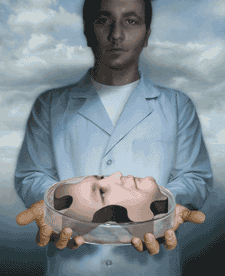Ética y Moral
Human clonation
RISKS OF HUMAN CLONATION
The advance of the knowledge referred to the dynamics and the organization
of the living phenomeno has motivated the sprouting of strong preoccupations
and on attempts of limitations and prohibitions the restrictions legals. In
some cases aim to avoid abuses, discriminations and dangers. In this just line
it is possible to be located to the work of the UNESCO, which persecutes the
establishment of a universal declaration on the principles that must regulate
the work of investigation and use of the knowledge produced by Biology in
the human beings. Also are reasonable the multiple initiatives destined to
impose restrictions to him to the reproductive clonation, is worth to say to
which it persecutes to clonar human beings, the multiple risks who it can
bring, according to it have denounced most prestigious cientifics. Of made
these fears have been demonstrated founded by the challenge of the Italian
doctor Severino Antinori, who has obtained that in marginal geographies is
made possible to develop to the first baby clone. Imprudence, omnipotencia,
uncontrol, eagerness of profit an manipulation of the expectations of
thousands of pairs with fertility problems are all present characteristics in an
action that involves risks difficult to anticipate and that they found manifold
repairs etics. In change, is different the case from the therapeutic clonation,
destined to the development of cells able to treat today incurables diseases
successfully. To prohibit the investigation in this land, if the development of
knowing would be being been uniting is that they could cure suffering.
Cause, then a just preoccupation the initiative of the president of the United
States,George W. Bush, prohibiting all the forms of human clonation, as
much the reproductive ones as the therapeutic ones. As it happens in many
areas, the decision of the central countries will repel in the rest, is for
repeating decisions, is for becoming seats of practices prohibited in others
societies. The doctors evaluate the risks of the human clonation like very
elevated. To submit itself to the clonation on the part of the humans does not
mean to assume a unknown risk, but to harm to the people consciously, has
who is in agreement with the clonation for the obtaining of a baby. Some
even, can be parents who lost a baby an whom they love to replace it, or they
can be people who wish to have children but that they do not obtain it of the
traditional way. For example, in case that a man cannot produce sperm, it can
do that his own DNA it is introduced in the ovum of his pair, creating a clone
of himself. With the clonation, the kind man against the life of his same
types in name of the well-being and of justice. When the speech of human
clonation one thinks fundamentally about two possibilities: to clonar human
beings as a new form of reproduction, and to clonar human embryos to obtain
from them cells that can be transplanted other people and be cured to them of
certain diseases. The human clonation is ineffective and is probable that it
continues it being in the future. Most of the clonations they cause alterations
of the development that are shown in the gestation or when being born.
In the best one of the cases, only a small percentage of the embryos created
by transference of the nucleus gets to be born and, of these,very few surpass
the perinatal period. The dysfunctions of the placenta seem to be the main
cause of death during the gestation. The clones new born present/display,
frequently, problems respiratory and problems of circulation, to which it
attributes the numerous deaths that take place in the neonative period. The
apparently healthy survivors even can undergo immune dysfunctions or
cerebral malformations or of the kidney, that causes their death later. Thus,
in case the human clonation is undertaken, the problem will not be only the
embryos that die, but those that will survive to become children or adults
abnormals. Las abnormalitys who present/display the clonados fetuses and the
few clones that get to be born are not attributable to the nucleus of the donor.
The most probable explanation is the failures in the genetic reprogramming.
The prenatal mortality of the nuclear clones can be due to an inadequate
reprogramming, that would produce a deregulation in the expression of the
genes. Some of the clones that survive the neonative period are probable that
they undergo underlying epigenéticos defects that, nevertheless, did not reach
the threshold from as the viability is it jeopardize.
La first good reason that advise against it from many points of view talks
about to the experimental character of the used techniques and the high risk of
failures and defective human beings. In addition this low rate to success would
need to use a high number of embryos, which would worsen the problem of
the storage and use of the leftover embryos. The reproductive clonation would
happen to become a consumption act more: something that is bought to
acquire a material good; in this case an identical human being to another one.
The human clonation creates delicate problems of identity and human
relations, specially in the family: All we are able to imagine, which could
happen if in our home was born a clone boy. Think for example about the
difficulties that are to face if it does not respond to the expectations of its
parents - what it is very probable, because the personality only depends partly
on the genetic patrimony the potential disadvantages of the human clonation
are in his opinion mainly the medical risks, for example the uncertainty on
possible complications to long term.
“THE CLONATION OF HUMAN BEINGS”



Descargar
| Enviado por: | El remitente no desea revelar su nombre |
| Idioma: | inglés |
| País: | Panamá |
